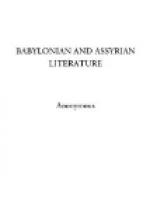One lifts his mighty arm across the sky,
And strikes the sun as it goes roaring by;
The fiery world with whiter heat now glows,
While a vast flood of flame behind it flows,
That curling, forms bright comets, meteors,
And planets multiplies, and blazing stars;
The robe of flames spreads vast across the sky,
Adorned with starry gems that sparkling fly
Upon the ambient ether forming suns
That through new orbits sing their orisons;
Their pealing thunders rend the trembling sky,
The endless anthem of eternity.
The monster turning to the King then says,
When nearer now his awful form doth blaze:
“So thus you see, my son, the gods are strong,
And to provoke great power, is foolish, wrong;
But whither goest thou, thou sad-eyed King,
What message hast thou;—to us here would
bring?”
The King now prostrate to the monsters prayed:
“Ye gods or demons, I within your glade
Of horrors, have unwilling come to seek
Our Khasisadra, who a spell can make
To turn the anger of the gods away.
Immortal lives the seer beside the sea,
He knoweth death and life, all secret things;
And this alone your servant to you brings.
The goddess sought my hand, which I denied,
And Anu’s fury thus I have defied;
This all my troubles caused, show me the way
To Khasisadra, this I ask and pray.”
The god’s vast face broke out with wondrous
smiles,
And laughing, ripples rolled along for miles;
His mouth wide opened its abyss and yawned,
As earthquake gulf, far spreading through the ground.
His roaring laughter shakes the earth around,
“Ho! ho! my son! so you at last have found
The Queen can hate, as well as love her friends,
And on thy journey Ishtar’s love thee sends?
A mortal wise thou wast, to her refuse,
For she can do with man what she may choose.
A mortal’s love, in truth, is wondrous strong,
A glorious thing it is, Life’s ceaseless song!
Within a cave upon the mountain side,
Thou there thy footsteps must to Hades guide,
Twelve kaspu go to yonder mountain gates,
A heart like thine may well defy the fates.
A darkness deep profound doth ever spread
Within those regions black,—Home of the
Dead.
Go, Izdubar! within this land of Mas,
Thy road doth lead, and to the west[2] doth pass,
And may the maidens sitting by the walls
Refresh thee, lead thee to the Happy Halls.”
The path they take behind the rising sun
The setting sun they pass,—with wings have
flown
The scorpion men,[3] within wide space have gone,
Thus from his sight the monsters far have flown.
[Footnote 1: “Mount Masu,” the Mountains of Masius, or “Mons Masius” of Strabo (vi. 12, Sec.Sec. 4, 14, 2, etc.), may be referred to by the author of the epic. These mountains are now known to the Turks as Jebel Tur and Karaiah Dag.—Rawlinson’s “Ancient Monarchies,” vol. ii. pp. 9 and 25.]




